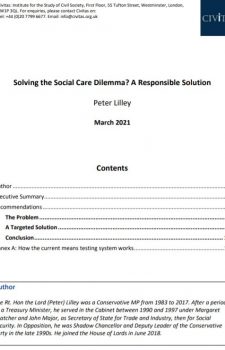Solving the Social Care Dilemma?: A Responsible Solution
Peter Lilley, March 2021
There was a glaring omission in the recent White Paper on reform of the NHS: it contained nothing about the long-promised reform of finance for Social Care – despite Covid having further undermined care homes’ perilous finances.
Like its predecessors, this government has been unable to resolve the two competing challenges. On the one hand, the pressure on local authority social care budgets cannot be maintained given the rising numbers of elderly people, the increase in the National Living Wage and the risk of care homes closing. On the other, most proposals to respond to the potent political pressure from homeowners (and their heirs) – who risk having to sell their home to pay for long-term social care – involve a competing pressure on public spending.
In this report, the former Social Security Secretary (1992-1997), Lord (Peter) Lilley, responds to those competing challenges by setting out a plan for a public not-for-profit company, owned and guaranteed by the state. This would enable homeowners to protect against having to sell their homes to pay for social care, at little or no extra cost to the taxpayer.
Peter Lilley plans that the company would offer everyone approaching state pension age the opportunity to take out insurance against the need to sell their home or other assets, to pay for social care if and when they meet the official conditions for such care.
He proposes that ‘the cost of such insurance would be calculated to be actuarially sufficient to pay for such care, so the insurer would aim to operate at no cost to the taxpayer. People would be able to pay for it by a charge on their home which would be realised when they die and/or the home is sold. Typically, that charge would be a modest fraction of the value of any home.’
The proposals present an alternative to other plans which would ‘mean the taxpayer shouldering a larger share of the cost of social care to the benefit of those who are better off, while putting an increased burden on council care budgets – which are already stretched to breaking point’.
Even if those other plans were ‘affordable in the past’, Lilley suggests, ‘it is clearly impossible post-Covid, when the UK has a national debt exceeding its annual national income, a massive deficit to bring under control and a commitment to level up across society.’
Private insurance has been considered as a possible way of spreading the cost and so avoiding the risk of losing one’s home to pay for long term care. However, it has been rejected since private insurers will not provide insurance because of uncertainties about government policy and future longevity – plus people will not contribute to such policies during their working lives on top of paying for their pensions and mortgages. But Peter Lilley concludes that since the private sector will not provide such insurance policies, a publicly owned body should do so and enable people to pay for them, not over their working life, but by taking a charge on their homes, which would be paid out of their estate.
It is suggested the amount to be insured, averaged over all insured homeowners, would potentially require a one-off premium of about £16,000 each – which ‘would pay for the social care costs in residential and nursing homes for all those insured people who turn out to need it’.
Those who choose not to take out such insurance, Lilley argues, ‘could not complain if, having rejected the opportunity to pay into the pool to pay for care for those who insure, they eventually find themselves paying for their own care from their own assets.’
On the other hand: ‘Those who do pay the premium would be confident that they could leave their homes and other assets to their heirs – who would be able to look forward to such bequests with greater confidence’.
‘The premium should reflect the value of the home/assets protected – so, those protecting a modest home would pay less than those with very valuable homes.’
Download PDF
